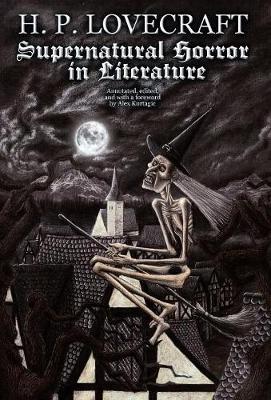Overview
Originally published in 1927 in W. Paul Cook's The Recluse, a small-circulation amateur magazine, Lovecraft's essay remains unparallelled as a survey of horror literature in the West, spanning the period from antiquity until the 1930s, and covering both the Anglo-American world and Continental Europe. Particularly interesting about horror literature is that its emergence as a genre coincided with the establishment and institutionalisation of liberalism, the latter of which represents a diametrically opposed worldview. This would suggest that horror literature, even if inadvertently or subconsciously, represents an attempt at escaping the limitations of the secular, materialist, rationalist liberal Weltanschauung, as well as a desire for meaning in a world rendered meaningless through 'liberation' from hierarchies, folk traditions, the occult, and the supernatural. Also interesting is the fact that the aesthetics of Gothic horror are invariably and luxuriantly beautiful (if in a dark way), whereas the logical extreme of rationality (utilitarianism, standardisation) is inherently anti-aesthetic. Would this not indicate, then, that the Age of Reason marked the beginning of a process that concluded in late modernity with the wholesale destruction of beauty, except where it, or the counterfeiting of it, was dictated by economic necessity? If so, we may view Lovecraft's essay not merely as a resource for those seeking entertainment within a genre of literature, but also for those seeking to escape, and begin to transcend, liberal modernity. It is perhaps no coincidence that Lovecraft's innate sensibility was elitist and aristocratic; or that he in many ways revolted against the modern world (even though he was scientifically minded); or that he was maddened by the cosmopolitan city (in 1925), repeatedly referring to the need for roots and tradition; or that he rejected humanism and humanist conceits in both his thought and fiction. This fully annotated edition aims at a recuperation, revision, and restatement of the importance of one of the most intriguing areas of the Western literary tradition; and comes complete with a foreword and Gothic cover artwork by Alex Kurtagic, a bibliography of the works mentioned by Lovecraft, a full index, and attractive design.
Full Product Details
Author: H. P. Lovecraft ,
Alex Kurtagic
Publisher: Wermod and Wermod Publishing Group
Imprint: Wermod and Wermod Publishing Group
Edition: Annotated edition
ISBN: 9781909606005
ISBN 10: 1909606006
Pages: 208
Publication Date: 10 June 2013
Audience:
General/trade
,
Adult education
,
College/higher education
,
General
,
Further / Higher Education
Format: Hardback
Publisher's Status: Active
Availability: Available To Order

We have confirmation that this item is in stock with the supplier. It will be ordered in for you and dispatched immediately.
Author Information
Howard Phillips H. P. Lovecraft (August 20, 1890 - March 15, 1937) was an American author who achieved posthumous fame through his influential works of horror fiction. Virtually unknown and only published in pulp magazines before he died in poverty, he is now regarded as one of the most significant 20th-century authors in his genre. Lovecraft was born in Providence, Rhode Island, where he spent most of his life. His father was confined to a mental institution when Lovecraft was 3 years old. His grandfather, a wealthy businessman, enjoyed storytelling and was an early influence. Intellectually precocious but sensitive, Lovecraft had begun composing rudimentary horror tales and had begun to be overwhelmed by feelings of anxiety by the age of 8. He encountered problems with peers in school, and was kept at home by his highly strung and overbearing mother for illnesses that may have been psychosomatic. In high school Lovecraft found his contemporaries were accepting and he formed friendships. He also involved neighborhood children in elaborate make-believe projects, only regretfully ceasing the activity at 17 years old. Despite leaving school in 1908 without graduating - he found mathematics particularly difficult - Lovecraft's knowledge of subjects that interested him (like history and linguistics, as well as inorganic chemistry and astronomy) was formidable.




